|
During a cold air inflation, the balloon doesn’t
stand straight up in preparation for launch, but the large cold fan
blowing into the envelope constantly does blow up the balloon to
almost full capacity, and allows people to walk inside it.
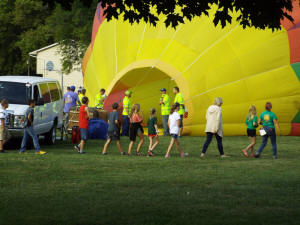
When the balloon was full of air, the kids and teachers walked
inside for their morning lesson. The classes filed in and everyone
sat down in rows according to their grade level from fifth down to
kindergarten. Then Vish spent the next few minutes speaking to the
children.


The first impression by many of the students as they
entered the balloon was one of awe as they got the grasp of just how
large the balloon really was. When all the students were assembled
and seated, they were really just a small speck inside the large
envelope.
Vish explained to the children, that typically, no one would ever be
allowed to walk on the silky material the balloon is made of.
However, this particular balloon, while still inflatable is no
longer flown in the sky. Instead, Vish uses it to teach children and
adults about ballooning, or to just permit folks the opportunity to
step inside and marvel at the size.
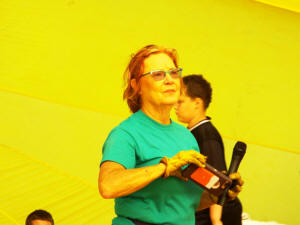
Vish told the children that ballooning takes a good
amount of math and science skill. Pilots need to understand the
impact of weather conditions on their balloon. They must understand
wind speeds, and temperatures. They must also know their geography a
bit so they can keep track of where they are when they are in the
air. In addition, they have to be skillful in lifting off safely,
but especially in landing safely.
Vish explained that when the balloon or envelop fills with hot air,
the hot air is lighter than cooler air, so the envelope stands up.
She pointed out the propane tanks in the basket and explained that
when she is in the air, she is flying with a real fire and has to be
cautious. She added that balloons today are safer than those first
flown back in the 1800’s because then the fire was from wood, not
gas.

Vish talked about safety around the balloons when they are
inflating. She said most pilots are happy to have people volunteer
to help in the “crew.” The crew members have specific jobs though,
and the volunteers should not just run in and start doing stuff
without asking. If someone wants to help it needs to be with the
pilots permission, and allow the pilot or a crew member to offer
instruction on what needs to be done.

She also noted that on Friday she had a special group crewing for
her. The staff from Illinois American Water in Lincoln was helping
out for the day and she thanked them for all their terrific help.
[to top of second column] |

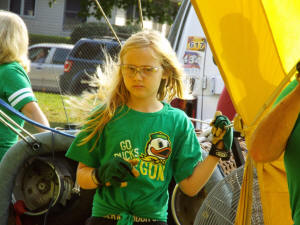
Using one of the fifth grade students as an
assistant, Vish also talked about robe safety around the balloon.
She noted there are many ropes connecting the balloon to the basket
and also ropes that are used to control the balloon while it is
being inflated. She said always be aware of all these robes when
walking around a balloon. She added that when helping with a crew,
if called on to man a rope, to always hold it with both hands, and
to never do silly playful things like wrapping the rope around the
neck.
Vish also talked about courtesy. She said that when
in the air, she has a ground crew following her in a vehicle. When
it comes time to land, she needs to find a nice open space where
landing will be safe. Then, before she goes down, her crew is in
contact with someone responsible for the land and makes sure they
have permission to land. If they can’t get permission then they move
on to another spot and try again. She said it is bad manners to do
something without permission, so she always makes sure to ask before
landing.
She added that most people are happy to give permission, and even
excited about it as they get the opportunity to witness the landing.
She remembered that one time she set her balloon down right in
someone’s front yard. The family all gathered on the porch and
watched the landing with great excitement.

Vish also fielded questions from the students. One asked about the
size of her basket, and if that was the only size available. Vish
said that there are a large number of basket styles used in
ballooning. She noted that the basket the children were seeing on
Friday was a two-person basket, meaning room for her as the pilot
and only one passenger. She said there are baskets that are much
larger, but the number of people in the basket impacts the weight of
it, and the balloons ability to float. She said larger baskets
require larger envelopes or balloons. She noted that the largest she
has heard of is a basket that will hold about 20 people, but she
said the balloon for that basket is about 20 times larger than the
balloon the children were sitting in.
One student asked about the “N” number that was stamped on the
envelope. Vish said in all the times she has done talks about the
balloon, the young persona on Friday was the first one to ever ask
that question. She complimented him on being so observant. She
explained that like airplanes, she has to register her balloon with
the Federal Aviation Administration. The number is used then to
track the balloon back to the pilot. This is useful for state police
and other officials who see the balloon in the air and have a
question or concern about the balloon. They can call in the number
and the FAA information can be relayed back to them in just a matter
of minutes.
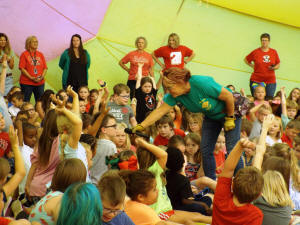
Some of the children used their question time to let Vish know that
they have ridden in a balloon, would like to ride in a balloon, or
would like to someday be a pilot themselves. Vish reminded them that
being a pilot takes skill, but it also takes intelligence and
education, so paying attention in school and learning math and
science will be important to them if they want to be pilots.
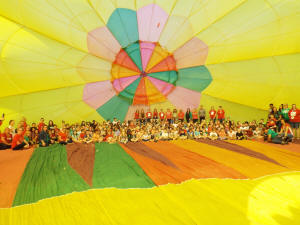
As their time inside the balloon came to an end, Vish said she
wanted to get a great big group photo of all the students for her
memory collection. Everyone was happy to oblige. Then class by
class, the students filed back out of the envelope and moved on to
enjoy the rest of their school day.
[Nila Smith] |